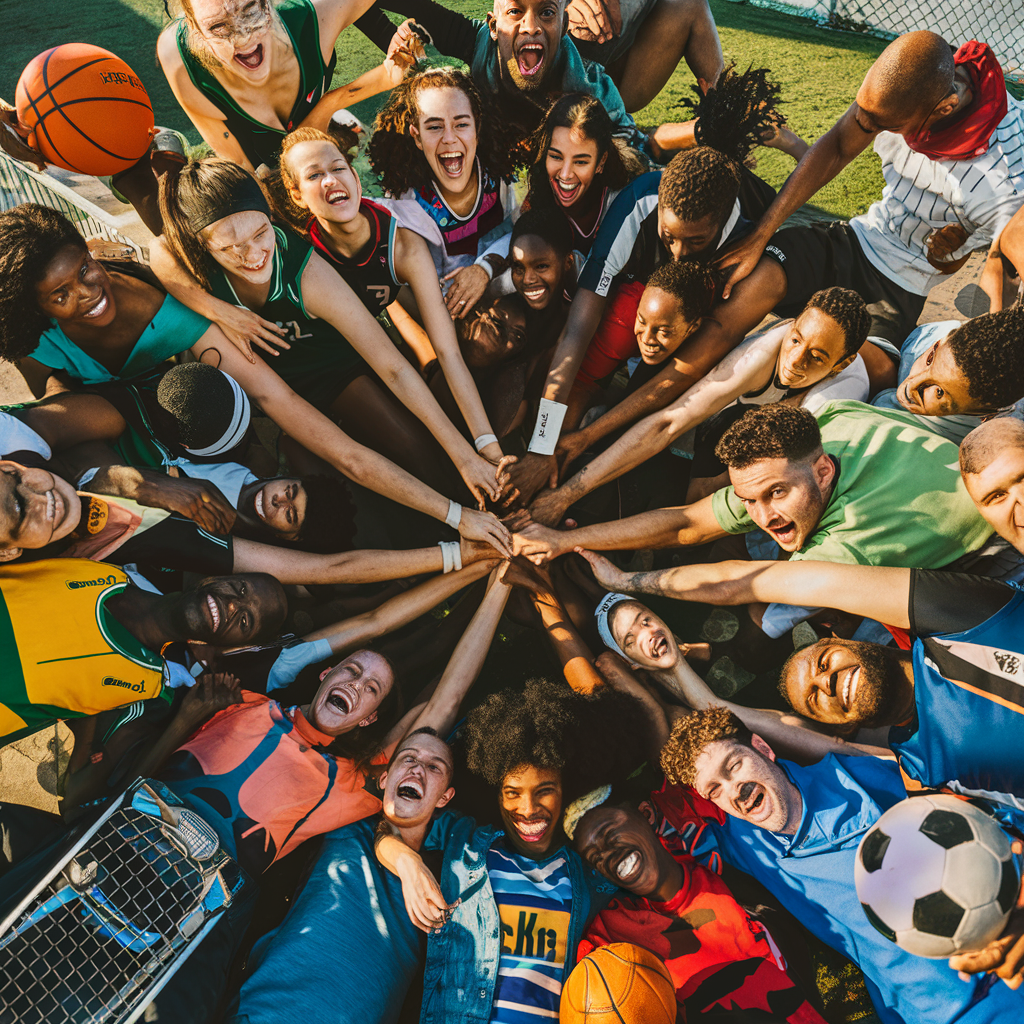Why Team Sports Foster Lifelong Friendships
Have you ever found yourself reminiscing about those sweaty afternoons spent on the field or court, battling it out with your teammates? The thrill of victory, the agony of defeat, and all those moments in between create a tapestry of experiences that often lead to friendships that last long after the final whistle blows. Team sports have a unique way of knitting people together, forging connections that can stand the test of time. Let’s explore how and why these bonds are formed, and the lasting impact they can have on our lives.
Shared Experiences: The Glue of Friendship
One of the most significant aspects of team sports is the shared experience. Whether it’s a nail-biting match or a casual practice session, these moments create memories that linger in our minds. I remember one particular game in high school—our team was down by two goals, and there were only ten minutes left on the clock. It felt like the end was nigh! But in a stunning turn of events, we rallied together, scoring three goals in those last few minutes. The sheer joy and disbelief were palpable, and the exhilaration we felt bonded us in a way that was almost magical.
This shared adrenaline rush isn’t merely about the high stakes of competition; it’s also about the mundane, everyday moments. The inside jokes that arise during grueling training sessions, the collective groans when someone misses an easy shot, or the celebratory pizza parties after a tough season—all of these experiences contribute to a deep sense of camaraderie among teammates.
Building Trust and Cooperation
Team sports inherently require trust and cooperation. Players must rely on each other to execute strategies, defend against opponents, and, ultimately, achieve a common goal. This interdependence fosters a unique bond. Trust doesn’t just develop overnight; it’s built through countless hours of practice and competition. There’s something about knowing that someone has your back—whether that’s defending you during a game or supporting you during a tough personal moment—that solidifies friendships.
Consider a soccer team, for example. Players must communicate effectively, anticipate each other’s moves, and work together to defend their goal. A well-timed pass can lead to a critical score, but it only happens if players have developed a connection. In this environment, friendships blossom naturally, as teammates learn to rely on one another, both on and off the field.
Overcoming Challenges Together
Challenges are part and parcel of any sport. They come in various forms—be it a tough opponent, an injury, or even the pressure of a big game. Facing these challenges together can be a catalyst for deepening friendships. When teammates endure hardships—like a tough loss or a grueling training regimen—they often find solace in each other. It’s a beautiful thing to see how a shared struggle can transform into a source of strength.
Take my friend Mike, for instance. He was a part of our basketball team that struggled for an entire season. Every game seemed to end in disappointment, yet through it all, we leaned on one another for support. Those moments of frustration led to late-night strategy sessions (and a few ice cream runs) that forged friendships that have lasted well into adulthood. Today, we still laugh about our misadventures on the court, and those shared challenges remain a cherished part of our history.
Inclusivity and Diversity: A Melting Pot of Connections
Team sports often bring together individuals from diverse backgrounds. This melting pot of different cultures, experiences, and perspectives can enrich friendships. When people come together with a common interest, it breaks down barriers and fosters understanding. I’ve seen it happen time and again—players from different schools, neighborhoods, and even countries unite for a shared passion, discovering common ground in their love for the game.
For example, I once played on an international volleyball team. We had members from five different countries, each bringing their unique flair to the game. Learning about each other’s backgrounds, traditions, and even quirky habits (who knew some people brought their own snacks to practice?) was an eye-opening experience. It fostered a sense of belonging that transcended cultural differences, leading to lifelong friendships that continue to thrive, even years later.
Creating a Support System
Friendships forged in the crucible of team sports often extend beyond the game itself. These bonds can develop into a robust support system that individuals rely on throughout their lives. When I think back to my own experiences, I can’t help but smile at the memories of teammates being there during life’s ups and downs—celebrating milestones and providing comfort during tough times.
Research supports this notion. Studies suggest that individuals who engage in team sports exhibit higher levels of well-being and social connection. The bonds formed through shared experiences can lead to lasting friendships that provide emotional support, encouragement, and camaraderie. These relationships can be invaluable, especially during challenging life transitions.
Emotional Intelligence and Communication
Participating in team sports provides a unique opportunity to develop essential life skills, including emotional intelligence and communication. Players learn to read the room, interpret non-verbal cues, and express their feelings effectively. These skills are crucial in forming and maintaining friendships. A teammate who can empathize during a tough loss or celebrate a victory with genuine joy becomes more than just a friend; they become a confidant.
I often chuckle when I remember our coach’s infamous pep talks. He had a knack for delivering motivational speeches that ranged from hilarious to downright moving. One time, he compared our team to a family—a dysfunctional one at that! But his point resonated. Just like family, we were there for each other, navigating the highs and lows of life together, equipped with the emotional intelligence that only comes from shared experiences.
Networking Opportunities
Let’s face it: team sports are not just about the game; they also open doors to networking opportunities. Many friendships formed in team sports lead to connections that can be beneficial in professional and personal contexts. Teammates often go on to work in various fields, and having that network can be advantageous. I’ve seen friends land jobs through connections made on the field, and it’s a testament to how those bonds can extend beyond the realm of sports.
Consider the myriad of industries where teamwork is essential—business, healthcare, education, and more. The skills developed through team sports—leadership, collaboration, and communication—are highly transferable to the workplace. The friendships formed in the heat of competition can foster professional relationships that endure long after the final game.
Fun, Laughter, and Lifelong Memories
Let’s not forget the sheer joy that comes from participating in team sports. The laughter, the inside jokes, and the moments of light-heartedness create an atmosphere that nurtures friendships. I can’t count the number of times I’ve burst out laughing during practice, whether it was because of a teammate’s hilarious attempt at a trick shot or a comical mishap during drills. Those moments of levity are often what people remember most fondly.
As we grow older, those shared laughs and silly memories become treasured stories—often recounted at gatherings and reunions. They serve as reminders of the good times, reinforcing the friendships that have withstood the test of time. The bonds formed through laughter are often the strongest, as they create a sense of connection that’s hard to break.
The Impact of Technology and Social Media
In today’s digital age, technology has transformed the way friendships are maintained. Social media platforms allow teammates to stay connected, share memories, and celebrate milestones—even from miles away. It’s fascinating how a group chat can keep friendships alive, allowing for easy communication and coordination for meet-ups or gatherings. I often find myself scrolling through old photos from team events, reminiscing about the good times and the bonds we built over the years.
However, it’s essential to strike a balance. While technology can help maintain friendships, nothing quite compares to the in-person connection formed during those sweaty games. Being physically present, sharing experiences, and creating memories together are irreplaceable. After all, you can’t replicate the joy of a spontaneous team outing or a celebratory dinner after a big win over a screen.
Conclusion: The Lasting Legacy of Team Sports
As we’ve explored, the friendships formed through team sports are often profound and lasting. From shared experiences and trust-building to overcoming challenges and developing essential life skills, these connections enrich our lives in countless ways. They provide a support system, foster emotional intelligence, and create a network that can benefit us personally and professionally.
Whether you’re still lacing up your cleats or reflecting on your days as a star athlete (or perhaps a bench warmer—no judgment here!), the bonds formed through team sports are an invaluable part of our journeys. So, next time you’re out on the field, court, or rink, remember that you’re not just playing a game; you’re building friendships that can last a lifetime.
As the saying goes, “Friends who play together, stay together.” And honestly, I can’t think of a truer statement. Here’s to the teammates who become lifelong friends and the memories we create along the way. Now, let’s grab a pizza to celebrate that win—because, after all, nothing says friendship like sharing a slice!









